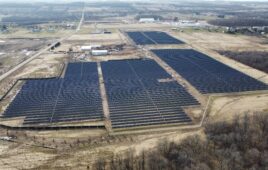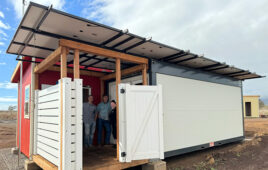Today a coalition of solar companies and clean energy advocacy organizations sent a letter to Massachusetts Senate President Karen Spilka and House Speaker Robert DeLeo strongly opposing a legislative provision that authorizes utilities to construct, operate and own solar projects.
The provision, Section 15H in the House Act Creating a 2050 Roadmap to a Clean and Thriving Commonwealth (H. 4993), would dramatically expand utility-owned solar in Massachusetts and effectively overturn the long-standing, prohibition against utilities owning power plants. Current law is largely responsible for solar growth in Massachusetts and what helped the state create over 10,000 solar jobs.
“Many years ago, the Massachusetts legislature broke up the state’s utilities because they had a monopoly on energy services and were socking ratepayers with high energy bills,” said David Gahl, senior director of Northeast state affairs at the Solar Energy Industries Association (SEIA). “This provision is a time machine back to that era. These anti-competitive actions will prevent Massachusetts from seeing the full benefits of a healthy solar economy and will once again leave ratepayers to pick up the tab.”
The proposed changes would dramatically impact the Commonwealth’s ability to create and sustain local solar businesses and jobs.
The coalition, which includes the Coalition for Community Solar Access, MassSolar, the Northeast Clean Energy Council, the Solar Energy Business Association of New England (SEBANE), SEIA, and Vote Solar, asserts that the changes would drive out local businesses at a time when Massachusetts is looking to get back on track amidst the global pandemic and economic uncertainty.
“Massachusetts is a national solar leader, spawning dozens of home-grown clean energy innovators that are positively impacting the industry and driving equitable access to solar,” said Zaid Ashai, CEO of Nexamp. “That innovation and access is only possible in a competitive landscape, free of monopolistic intrusion. Handing ownership of solar projects to the utilities will undermine the progress already made and negatively affect ratepayers. Clean energy progress, good local jobs, and affordable utility costs are all at stake here. Nexamp and its proud Massachusetts workforce urge leaders to make the right decision and keep energy options in the hands of consumers and independent, innovative companies.”
“For decades, stiff competition among clean energy businesses in Massachusetts drove down the cost of solar while putting money back into the customer’s pocket,” said Mark Sylvia, president of SEBANE. “The market is working as designed. To now pull the rug out from under developers, large and small, would threaten the solar industry’s ability to create jobs and make long-term investment decisions. This proposal is bad for business and bad for our economic recovery.”
“The competitive market and record low energy prices that Massachusetts enjoys today are a direct result of policies that got utilities out of the power generation business. It is imperative we don’t circumvent these rules now by introducing a provision that will ultimately limit competition and lead to higher utility bills for ratepayers,” said Erika Niedowski, northeast director of policy for Coalition for Community Solar Access. “Legislators should reject this provision outright. Not only would it be unprecedented to make this change without engaging stakeholders, but this provision most certainly takes the Commonwealth in reverse and unfairly benefits utilities at the expense of ratepayers.”
The coalition notes that they strongly support putting aggressive greenhouse gas reduction targets in law but urge them to drop Section 15H of H.4933 from the final climate legislation to preserve competition and protect Massachusetts’ solar industry.
Read the coalition’s letter below.
News item from SEIA





““Many years ago, the Massachusetts legislature broke up the state’s utilities because they had a monopoly on energy services and were socking ratepayers with high energy bills,” said David Gahl, senior director of Northeast state affairs at the Solar Energy Industries Association (SEIA). “This provision is a time machine back to that era. These anti-competitive actions will prevent Massachusetts from seeing the full benefits of a healthy solar economy and will once again leave ratepayers to pick up the tab.””
Technology has taken leaps and bounds over the last 10 years. The rote electric utilities still want ‘their’ regulated monopoly where they own the generation and control when and how much to supply to the grid. They want to be able to “curtail” and throw away excess solar PV generation during the duck curve and then use fueled generation resources to ramp around grid load demands. How much curtailment of non-fueled generation and how much “requirement” of fueled generation on the spot market, depends on the utility’s capacity calculations. A goal all homeowners should seriously consider is overdesigning a solar PV system and installing a smart ESS with lots of energy storage. Using the grid to back up your home and having a self consumption system that takes care of most of your daily energy needs puts the utility and the Legislature in their respective places, leaving you out of the energy merry-go-round.